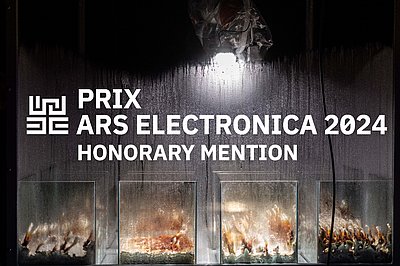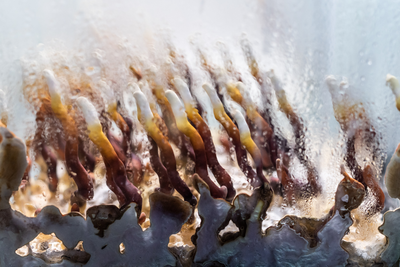Prix Ars Electronica 2024
Noor Stenfert Kroese und Amir Bastan, PhD-Kandidat*innen sowie Absolvent*innen des Masterstudiums Interface Cultures, wurden für ZOE im Rahmen des Prix Ars Electronica 2024 mit einer Anerkennung in der Kategorie Interactive Art + ausgezeichnet. Wir gratulieren herzlich!
ZOE
ZOE is a temporary co-existence between reishi mushrooms and a custom-made robotic system. Noor Stenfert Kroese and Amir Bastan explore the possibilities of internal communication between a robotic system and reishi with ZOE. Despite the seeming paradox between nature and technology, an ecosystem in which they care for and affect each other through sensing technologies is created. It proceeds to research the interaction and unknown communication within fungal mycelia networks.
ZOE uses sensors to collect data from the environment as well as the mycelium of the reishi. It uses this data to create the internal communication between the reishi and the robotic system. The reishi and their behavior define what the robotic system does and the robotic system influences the shape of the light-sensitive reishi mushrooms. Over time, this influence sculpts the shape of the fruiting bodies of the reishi as a reflection of their ecosystem. The data is used in the space to create a sensory experience to explore this unknown communication. Finally, the data carpets are created from the daily collected data from reishi in relation to their environment, to see if we can detect any correlation between them. These tactile data visualizations explore the outcome and the unknown communication going on in this temporary co-existence.
ZOE is the first step in ongoing Mycobotics research. This research focuses on the possibilities of biocomputing with fungi through robotics and other than human-computer interaction. We focus on technical and narrative aspects to create an environment for meaningful collaboration, using timelines, state machines, and behavioral trees. We explore the intricate connections between human and non-human entities and the role of data in shaping these interactions. We use industrial robots and their quality of repetition and precision as the interface to reconsider the dynamics between technology and nature, encompassing both human and non-human aspects.
Support from: Produced by Productiehuis Theater Rotterdam with support of Art Climate & Transition - EU Creative Europe project. In co-production with Creative Robotics, KUKA, and Mushroom Research Center Austria.
Jury Statment
In ZOE Noor Stenfert Kroese and Amir Bastan create temporary co-existence between reishi mushrooms and a custom-made robotic system. Through sensing technologies an ecosystem that cares for and affects each other acquires visible and visual form: the reishi and their behavior define what the robotic system does and the robotic system influences the shape of the light-sensitive reishi mushrooms. Sculpted through the mutual influence shape of the fruiting bodies of the reishi is a reflection of and a sensory experience to explore this unknown communication. Additionally, artists create tactile data visualizations or "data-carpets" trying to further unveil communication within this coexistence and find further possible correlations. ZOE explores Mycobotics, possibilities of biocomputing with fungi through robotics and more than human-computer interaction. Using industrial robots and their quality of repetition and precision, artists reconsider the dynamics between technology and nature, encompassing both human and non-human aspects.
Noor Stenfert Kroese (NL) is a new media artist, scenographer and PhD candidate at Creative Robotics at the University of Arts Linz. Her current research focuses on data storytelling of/with living organisms, fungi-inspired biocomputing, and other-than-human interactions with industrial robots.
Amir Bastan (IR) is a new media artist with a background in fine arts and philosophy. He is a researcher and lecturer at the Creative Robotics department at the University of Arts Linz. Human Robot Transference is the centerpiece of his current research, drawing parallels between psychoanalysis theories and human-robot interaction within the context of new media arts.

